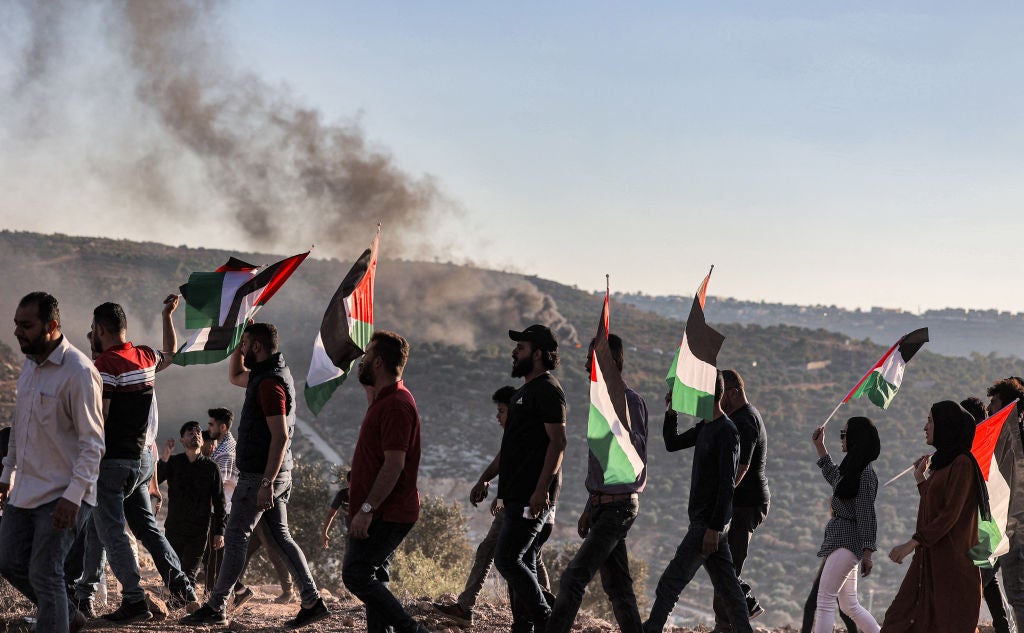My hometown of Beita offers all Palestinians hope – and a way out of this crisis
What is happening now is an extension of the experience of cumulative struggle enjoyed by Beita


Since May, Palestinians have been mobilising against the new illegal Israeli settlement outpost, “Eviatar” near Nablus, with the focal point of these protests my hometown of Beita. Over these last two months, I have been asked the same question repeatedly: “Why Beita?” How did this West Bank town come to lead a popular resistance struggle?
First, the idea of popular resistance is not new to the Palestinian people; it was adopted during the revolt of 1936, in which we boycotted the British Mandate and declared civil disobedience against it and its institutions, tactics later repeated during the First Intifada.
Beita was present in both uprisings; as children, we grew up with songs and stories of our community’s history of resistance, from the days of British colonial rule through to Israel’s ongoing occupation and settler expansion. What is happening now is an extension of the experience of cumulative struggle enjoyed by Beita.
One element that has played in Beita’s favour is its geographical location. It is a relatively remote town, far from points of direct contact with settlers. In addition, the town is primarily a service economy, with most goods that are produced in Beita sold in the Palestinian, rather than settler, market. Although a large part of the town’s economy depends on Israel, the relationship of Beita’s Palestinian worker with the Israeli employer ends with the end of the work day. The less dependent the town is on economic integration with Israeli settlers, the more determined and fearless they are in resisting settler expansion.
Strikingly, some 30 per cent of the town’s 16,000 population are young people – an important factor that contributes to the vitality of the popular resistance here (and is in contrast to the demographics of other Palestinian towns and villages threatened by settlement activity).
In Beita, Israeli occupation forces never enter without facing fierce resistance. Our youth always rise to defend their town with all they’ve got, and our people enjoy a collective sense of defence. Here you will find the doctor, the academic, the pharmacist, the worker and the students all in one front; political and family differences dissolve when the town is exposed to danger.
The popular resistance against the settler takeover has been characterised by creativity; burning tyres so that the wind blows smoke towards the new settlement, shining lasers, night marches with flaming torches, and drumming to make sure settlers don’t enjoy any rest on stolen land.
Beita’s youth have been able to maintain this spirit and unity through their awareness and belief in the justice of their cause. The occupation did not succeed in disintegrating the common collective spirit of the people of Beita, despite killing four and injuring hundreds since May.
There are daily donations from shops and restaurant owners, who send water, sweets, and meals to the youth on the mountain. Owners of large transport vehicles bring more tyres from the cities, and there is a constant presence of ambulances and paramedics in case they are needed.
The people of Beita might be fighting alone, but the truth is that they are still dreaming of a great homeland. Although only 20 per cent of the area targeted by settlers belongs to Beita, with the rest belonging to neighbouring villages, this has made no difference; thus, I believe Beita has broken a pattern whereby each town or village defends its own lands.
The people are continuing their resistance, after the new Israeli government made a deal with the settlers that leaves the settlement and army on the hillside, while the land theft can be formalised. Just last Friday, Israeli forces injured 31 protesters with live fire.
The people of Beita offer us Palestinians a solution to get out of the crises of trust, division, hesitation and setback that we are experiencing now. We are calling upon the Palestinian Authority to do more than support us with mere rhetoric. We need commitment, action and material support directly from the offices of our leadership. For without such support, and without wider popular support from the Palestinian society, our movement cannot be sustained as it is today.
Dr Amjad El-Ezz is head of the social studies department at the Arab American University, Ramallah
Join our commenting forum
Join thought-provoking conversations, follow other Independent readers and see their replies
Comments
Bookmark popover
Removed from bookmarks